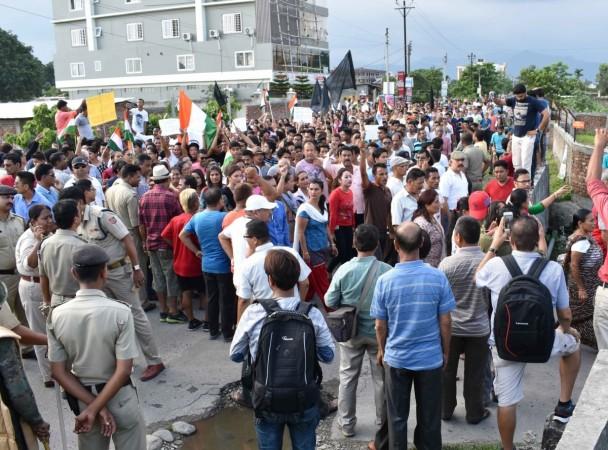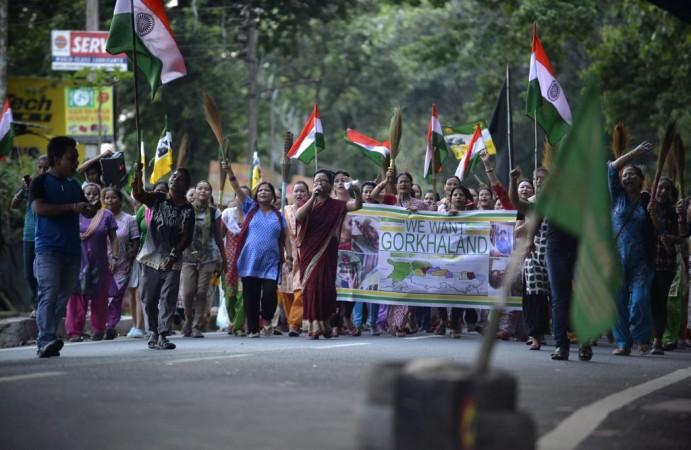
Even as the Gorkhaland agitation that started on June 15, 2017, refuses to die down with the West Bengal government evidently unwilling to give in to the residents' demands, it looked like people of Darjeeling, Kurseong, Kalimpong, and surrounding areas could heave a sigh of relief, at least temporarily, when it was announced that the ongoing shutdown would be relaxed for 12 days.
Mamata Banerjee has killed democracy with violation of human rights
The relaxation, from September 1-12, was announced by Gorkha Janmukti Morcha's chief coordinator Binay Tamang, who said that schools, offices, markets, and public transport would operate normally for these 12 days. He had also explained that a decision on whether to continue the strike or not would be taken after a meeting with the state government on September 12.
However, these hopes were soon shattered when GJM chief Bimal Gurung opposed the relaxation and said that "traitors" could be joining hands with the West Bengal government to foil the stir for a separate state.
"For the last three months we have been fighting for the prestige of our community. But I got the signal for the last few days that some of our leaders have joined hands with the Bengal government to fail our long standing movement for Gorkhaland," IANS quoted Gurung as saying.
Gurung asked the residents of the north Bengal hills to oppose this move and demand for a separate state more aggressively and even removed Tamang from his post after the issue.
"We appeal to the Gorkha people to strongly oppose Binay Tamang's announcement to call off the strike. In order to ensure that the shutdown is not withdrawn, the agitation in all parts of the hills needs to be further intensified from tomorrow."
Post his appeal, activists in north Bengal took out processions and torch rallies at several places in support of the agitation.
Gurung also said that there is evidence on how a few leaders of GJM are colluding with the Mamata Banerjee-government and even helping the state authorities to disrupt the protest and intimidate him.
Meanwhile, GJM leader and Darjeeling MLA, Amar Rai believes that Banerjee was behind this rift within the party and said that it looks like she has managed to "break the unity of the GJM."

"This is unfortunate that there are differences of opinion among GJM leaders."
Rift is prominent after Binay Tamang and others leaders met Mamata Banerjee yesterday for the all-party meet. It seems that the state government is desperate to break our unity. I would like to say that all of us (except few) are united and no one can hamper our movement for separate Gorkhaland. We want a separate and there is no compromise on it," he added.
The hill region of West Bengal has been dogged by the bandh and the strike enters the 79th day today, September 1. Since the strike began, the Mamata Banerjee-government has been accused of violating human rights on numerous occasions and clashes between the people and the police force have made quite some news.
Nine GJM supporters have lost their lives since the agitation began, and on Thursday, August 31, a 48-year-old woman became the 10th casualty. Romala Rai from Darjeeling died after suffering a head injury during police lathi-charge, which seems to have become commonplace in a region that is known to be peaceful and hospitable.
Amid the tensions, North Bengal continues to remain cut-off from the rest of the world due to the ongoing internet ban.
Thanks to the rift in the party, it now looks like the GJM not only has the task of taking on the West Bengal government but also needs to set its equations within the party straight and ensure that all the members are on the same page.





!['Lip lock, pressure, pyaar': Vidya Balan- Pratik Gandhi shine in non-judgmental infidelity romcom Do Aur Do Pyaar [ Review]](https://data1.ibtimes.co.in/en/full/797104/lip-lock-pressure-pyaar-vidya-balan-pratik-gandhi-shine-non-judgmental-infidelity-romcom.jpg?w=220&h=138)








